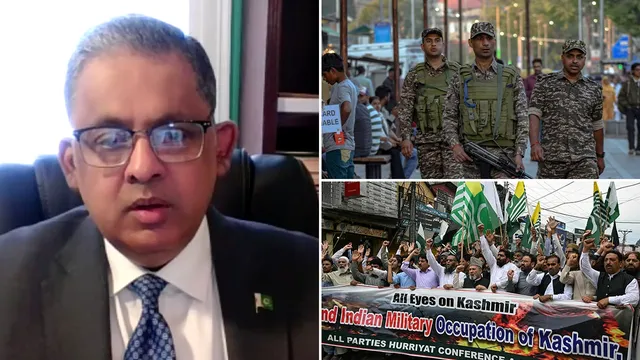
Modi grants military freedom to retaliate against Kashmir attack
2025-05-02 15:28- A terrorist attack in Pahalgam, Jammu and Kashmir, resulted in 26 fatalities, most of whom were Hindu tourists.
- In response to the attack, Prime Minister Narendra Modi authorized the military to take decisive action against terrorism.
- Heightened tensions between India and Pakistan are evident as Modi’s government implements punitive measures while stressing military readiness.
Express your sentiment!
Insights
In India, on April 22, 2025, a terrorist attack occurred in Pahalgam, Jammu and Kashmir, resulting in the deaths of 26 people, primarily local Hindu tourists. This assault was reportedly carried out by a militant group known as the Resistance Front, which has ties to the Pakistan-based Lashkar-e-Taiba. Following this tragic event, Indian Prime Minister Narendra Modi convened a series of meetings with key military and security officials to strategize a response, emphasizing the importance of punishing those responsible and their backing. The attack is noted as one of the deadliest since the 2008 Mumbai attacks, reigniting tensions between nuclear-armed neighbors India and Pakistan, who have a long history of conflict, particularly over the Kashmir region. Reacting decisively to the attack, Modi's government announced a suspension of the 1960 Indus Water Treaty with Pakistan, among various punitive measures aimed at holding Pakistan accountable for its alleged support of cross-border terrorism. These actions reflect the Modi administration's tougher stance against terrorism, aiming to demonstrate a commitment to national security and justice for the victims. Increased military presence and operations in Jammu and Kashmir are now ongoing, with security measures being heightened significantly in response to the rising threat of terrorism in a contested region. Prime Minister Modi reiterated his vow to hunt down and punish the terrorists and their supporters, indicating a new phase of aggressiveness in India's military posture. Analysts suggest that this military strategy is aligned with Modi's foreign policy, which has increasingly taken a militant approach to challenges posed by Pakistan. With civilian casualties and security lapses highlighted by the attack, public pressure is mounting within India for a robust retaliation, marking a critical point in the ongoing conflict over Kashmir, while potential escalations between the two countries raise serious concerns on the international stage. As the situation develops, Modi's concurrent meeting with his Cabinet Committee on Security led to reports of punitive and diplomatic measures against Pakistan, underscoring the urgency of addressing the threat posed by militant groups. The ramifications of the Pahalgam attack are already resonating in regional politics, as India seeks to navigate a path between upholding national security and managing an increasingly hostile neighbor.
Contexts
The Kashmir conflict, rooted in the partition of British India in 1947, has evolved into a significant geopolitical issue between India and Pakistan. At the time of partition, the princely states had the right to choose whether to join India or Pakistan. Maharaja Hari Singh, the ruler of the princely state of Jammu and Kashmir, initially sought to remain independent. However, following an invasion by tribal militias from Pakistan, he opted to accede to India in October 1947 in exchange for military assistance. This accession introduced the region into a complex conflict, profoundly affecting bilateral relations between the two nations and leading to the first Indo-Pakistani war in 1947-1948. The conflict culminated in a United Nations-mediated ceasefire in January 1949, resulting in the establishment of the Line of Control (LoC), which effectively divided Kashmir into territories controlled by India and Pakistan, yet neither country was satisfied with the status quo. Over the decades, diplomatic engagements and military confrontations have defined the Kashmir dynamics, with the territory becoming a flashpoint for hostility. The 1965 war further solidified Kashmir as a contentious issue, with both nations refusing to compromise on their aspirations for the region. The Simla Agreement of 1972 aimed to promote peaceful resolution, calling for bilateral discussions but ultimately failed to resolve the core issues. During the late 1980s, an insurgency erupted in Indian-administered Kashmir, fueled by multiple factors, including dissatisfaction with Indian rule and support from elements within Pakistan. The insurgency has led to significant human rights violations, a heightened military presence, and an ongoing cycle of violence. The Kashmiri population remains caught in the crossfire, with countless civilians impacted by the protracted conflict. International attention has periodically focused on Kashmir, particularly as both nations possess nuclear capabilities, raising concerns over a possible escalation of hostilities. Despite several rounds of peace talks, the lack of trust and differing narratives about the conflict have hindered any real progress towards resolution. The Indian government's recent actions, particularly the revocation of Article 370 in August 2019, which granted special status to Jammu and Kashmir, have intensified tensions, attracting widespread criticism from Pakistan and further complicating the dialogue process. In conclusion, the Kashmir conflict embodies a unique historical conflict shaped by colonial legacies, national aspirations, and subsequent political realities. Attempts to resolve the situation have been marred by deep-rooted mistrust, domestic political considerations, and regional dynamics. As the situation continues to develop, international stakeholders remain watchful, aware that the resolution of the Kashmir dispute is crucial not only for India and Pakistan but also for maintaining regional stability in South Asia. The complex interplay of history, politics, and identity in Kashmir underscores the challenges faced by both nations in their quest for lasting peace.